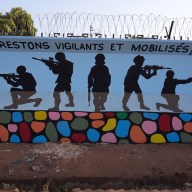YANGON, Myanmar – The United Nations said Friday that severe restrictions by Myanmar’s military junta have left aid agencies largely in the dark about the extent of survivors’ suffering two weeks after a killer cyclone left up to 2.5 million people destitute.
John Holmes, UN undersecretary general for humanitarian affairs, will go to Myanmar on Sunday to try to convince junta leaders to grant more access for UN relief workers and massively scale up aid efforts, said Amanda Pitt, a UN spokeswoman in Bangkok, Thailand.
Officials of various UN agencies called a news conference in Bangkok to give an update on their relief operations. The most basic data was missing, from the number of orphans to the extent of diseases and the number of refugee camps.
They also couldn’t say whether all survivors are in camps, on the move or still living in destroyed villages in the hardest-hit Irrawaddy delta, an area the size of Austria. Cyclone Nargis also pounded Yangon, Myanmar’s main city.
“The risk increases with each passing day,” Pitt said, referring to the vulnerability of survivors to outbreaks of disease and other problems.
The government says at least 43,318 people were killed and nearly 28,000 went missing when the May 2-3 cyclone turned the low-lying delta into a quagmire of shattered villages and squalid refugee camps ringed by fetid waters.
The Red Cross fears the toll may be as high as 128,000; the UN estimates more than 100,000 died.
In the absence of a clear picture, the UN estimates some 1.5 million to 2.5 million survivors are in desperate need of food, water, shelter and medical care. Aid groups have reached only 270,000 so far.
The junta insists Myanmar nationals and government agencies, including the military, can handle relief operations, particularly aid distribution.
“We still have obstacles to relief workers getting to the delta region, which doesn’t help,” Pitt said. “We are concerned about the effects on the people. It is clear, from what everyone is saying, the aid effort is far from over.”
The United Nations says the regime has issued 40 visas to its staffers and another 46 to non-government agencies but has confined the personnel to the immediate Yangon area.
Steve Marshall, a UN official who just came out of Myanmar and is the country’s liaison officer for the International Labour Organization, laid out the hurdles that aid agencies face.
He said the military has set up checkpoints on the two main roads to the delta to keep foreigners out of the disaster zone. Even local staff have to negotiate with the military to gain access to the camps.
“Things will still get done, but they will not be done as effectively, efficiently or as quickly, which means delays, which means increasing risk in terms of health, security and in terms of longer-term rehabilitation and getting back to a normal lifestyle,” he said.
The UN Children’s Fund said Friday the agency’s fourth flight into Myanmar, scheduled for Saturday, would deliver several tonnes of food for malnourished children. Radio broadcasts are trying to help lost children find their families, it said.
Also scheduled to arrive this weekend are two of 10 tonnes of medicine and medical equipment from Israel and the American Jewish Joint Distribution Committee, said agency executive Amos Avgar.
In the absence of an organized relief effort by the government, ordinary people are stepping in, with shopkeepers handing out free rice porridge and medical students caring for the sick.
Daw Mya Win, a 49-year-old grocer in a Yangon suburb, cooks rice porridge every day to feed anyone who comes. She also sends pots of it to some of the thousands of homeless sheltering in Buddhist monasteries.
College students are going door-to-door, handing out a few pennies to families for rice.
“Whenever we distribute rice and clothing, I can see the faces of the cyclone victims light up. It is very rewarding to see them smile,” said Nyi Nyi, 21.
Private citizens who have tried to take aid from Yangon to the delta said they have been blocked by police checkpoints and ordered to hand over their supplies to the army.
The military, which has ruled the country for 46 years, has denied allegations that it has diverted relief supplies, and solid evidence has yet to surface. On Thursday, the government warned hoarders of aid they face legal action.
British Prime Minister Gordon Brown said Thursday the United Nations was organizing an emergency summit in Asia to co-ordinate global efforts to help the survivors. He did not say when it might take place.
















